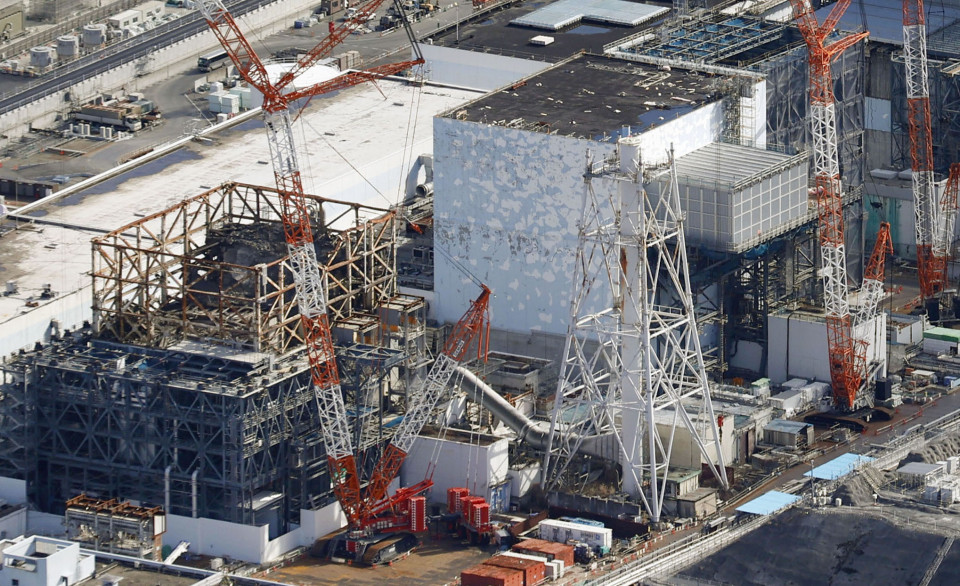Voters are likely to focus on rising utility bills rather than Japan’s future energy policy when they head to the polls in the forthcoming lower house election, with most of the major parties having tweaked their pledges regarding nuclear power generation.
The ruling Liberal Democratic Party and the main opposition parties say Japan should push ahead with nuclear energy or has to rely on it at least for the time being, revising their policies from the previous House of Representatives election.
While the public remains concerned about the safety of reactors more than a decade after the Fukushima nuclear crisis, nuclear energy does not appear to be a major issue ahead of the Oct. 27 election, experts say.
“Voters do not appear to view the issue as a decisive factor,” said Masamichi Ida, professor at Meiji University.
Voters are more interested in their hefty electricity and gas bills than the future national energy mix, experts say.

File photo taken in February 2024 shows the No. 1 (L) and No. 2 units of the crippled Fukushima Daiichi nuclear power plant in Fukushima Prefecture. (Kyodo)
In the latest Kyodo News survey of voters’ top priorities, which allowed multiple responses, 60.8 percent said inflation relief and other economic measures, 36.7 percent said pension and other social security issues, and 23.8 percent said childcare support amid the graying population. Nuclear power and other energy issues were selected by 6.7 percent.
“A government’s long-term energy policy tends to be technical, something that voters perhaps think should be debated by experts,” Ida said.
Sunday’s vote will be the first general election since Prime Minister Shigeru Ishiba’s predecessor Fumio Kishida decided in 2022 to promote the use of nuclear power generation, marking a major policy shift after energy security risks grew stronger in the wake Russia’s full-scale invasion of Ukraine.
For Japan, the world’s fifth-biggest energy consumer, energy policy is critical, given that data center power demand linked to artificial intelligence is poised to surge.
Japan’s energy self-sufficiency rate stood at 13.3 percent in the fiscal year ended March 2022, ranking 37th among the 38 member countries of the Organization for Economic Cooperation and Development.
Ishiba’s LDP has pledged to make maximum use of nuclear power generation to boost decarbonization and meet power demand. The party previously said it would seek to reduce the country’s reliance on nuclear power as much as possible.
The Constitutional Democratic Party of Japan, the LDP’s main rival, remains opposed to the construction of new reactors but has dropped its previous pledge to phase out nuclear energy.
The Democratic Party for the People, which had sought an exit from nuclear power, is now calling new reactors to be built so Japan will not have to import energy from other countries. The Japan Innovation Party has not changed its policy, saying it will seek to utilize next-generation reactors and promote nuclear technology development.
All of Japan’s nuclear plants were shut down at one stage in the aftermath of the reactor meltdowns at the Fukushima complex in 2011. The government currently allows reactors to be restarted if they have met stricter safety regulations introduced after the nuclear disaster.
The majority of respondents to Kyodo News opinion polls in recent years have expressed opposition to nuclear power generation.
A survey by the Japan Atomic Energy Relations Organization in October 2023 found far more respondents had a negative rather than positive image of nuclear power, with 54 percent choosing “dangerous” and over 40 percent “worrying” when answering a multiple-response question.
More than 40 percent also thought nuclear power generation should be phased out, the survey showed.
Only 5.7 percent said more electricity should be generated by nuclear power plants, while 13.4 percent said nuclear energy use should return to the level prior to the Fukushima crisis.
Experts say voters should give as much consideration to energy policy as utility bills.
“The energy issue is of course important and could result in changes to electricity charges, which are closely linked to voters’ everyday life,” Meiji University’s Ida said.
Younger voters appear to be more supportive of nuclear energy but that does not necessarily mean political parties in favor of nuclear power will garner support from them.
“I have the impression that young people in Japan are especially aware that electricity demand will grow due to data centers…and that such demand cannot be covered stably by renewable energy,” said Hisanori Nei, professor emeritus at the National Graduate Institute for Policy Studies.
“But even if the public recognizes the necessity of nuclear power, I think their current worries stem from their doubts about whether utilities are fit to operate nuclear plants” safely, the former deputy director general of the now-defunct Nuclear and Industrial Safety Agency said.
Under the government’s energy plan launched in October 2021, Japan aims to cut power generation from fossil fuels, including coal and liquefied natural gas, to 41 percent of overall electricity demand in fiscal 2030, while raising reliance on renewables to 36 to 38 percent and nuclear power to 20 to 22 percent in the targeted year.
But in fiscal 2022, nuclear power accounted for only 5.6 percent and renewables for 21.7 percent of Japan’s electricity generation, with the country relying on fossil fuels for 72.7 percent.
Related coverage:
Japan ruling bloc struggling to retain lower house majority: poll
FOCUS: Opposition’s ex-PM Noda may give ruling LDP good fight in election
FOCUS: PM Ishiba’s drastic wage hike push may hurt small firms in Japan